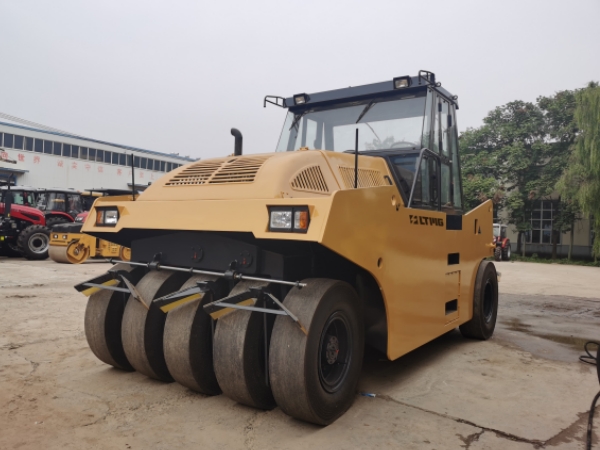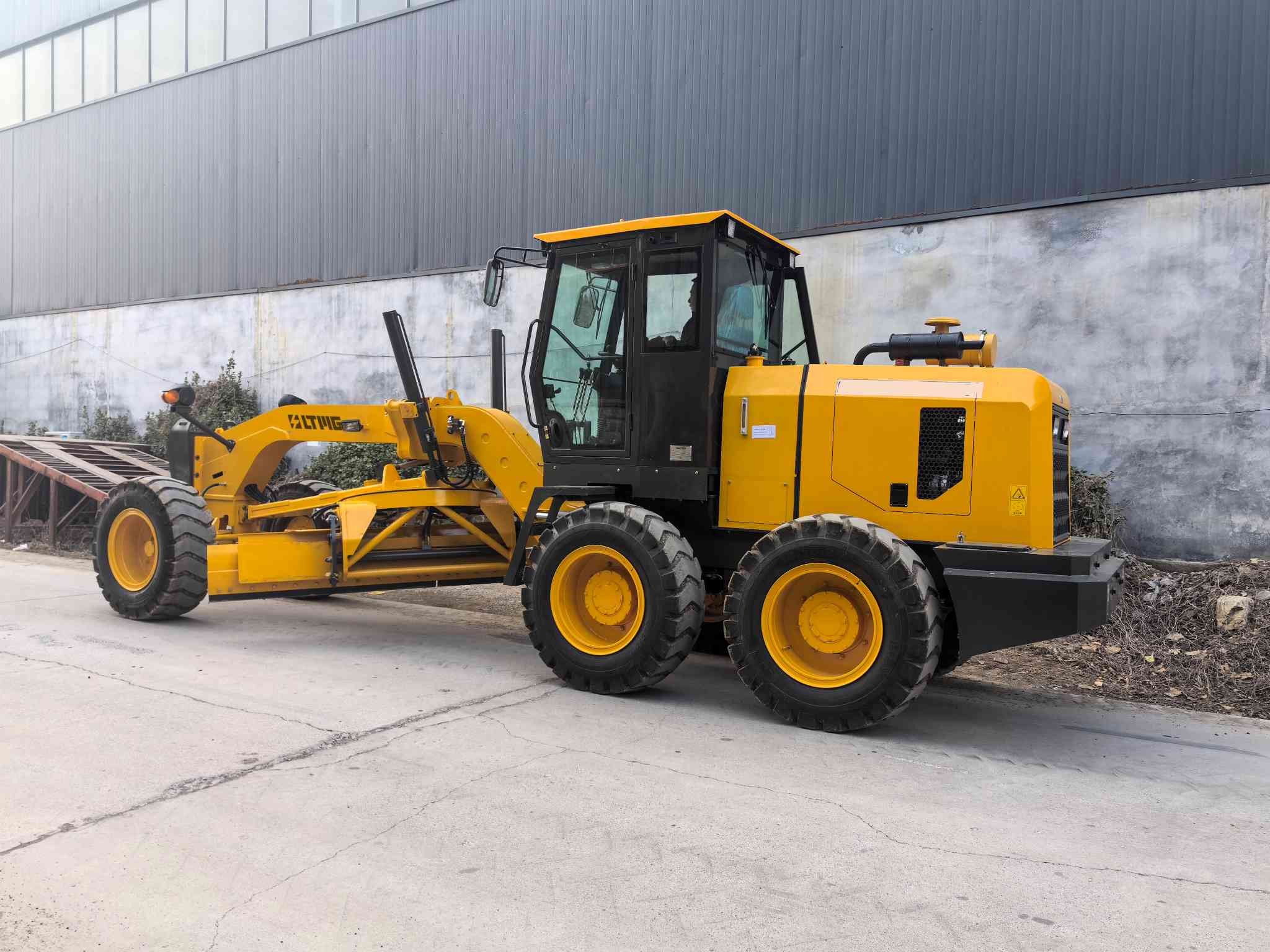Motor Graders, Bulldozers, and Rollers: In-Depth Analysis of Three Major Road Construction Machines
Dec 31, 2024
In road construction, earthwork operations, and infrastructure projects, road machinery plays a critical role. Motor graders, bulldozers, and rollers are the most commonly used equipment, each with its own unique functions and applications. Understanding the characteristics of these machines and how to select the right equipment is crucial for improving construction efficiency and ensuring the quality of the project. In this article, we will explore the differences and real-world applications of these three road construction machines.
Motor Graders: Precision Leveling to Enhance Pavement Quality
A motor grader is primarily used for earth leveling and slope adjustment, widely applied in road construction, airport runway laying, and large-scale earthwork projects. Its key feature is the adjustable blade system, which enables efficient leveling of surfaces in various soil conditions.
The motor grader works by adjusting the angle and depth of its blade, precisely controlling the distribution and depth of the soil to ensure the surface meets the desired flatness and slope. Its powerful engine system is designed to handle complex terrains and large-scale earthmoving tasks. Specifically, tracked motor graders provide stronger traction, making them suitable for muddy or unstable surfaces.
Motor graders are commonly used in the following areas:
Road Construction: For earth leveling during the construction of new roads.
Airport Runway Construction: Ensuring the proper flatness and slope of runways.
Land Reclamation: Used for leveling land in agricultural and hydraulic projects.
When selecting a motor grader, factors such as the blade system's adjustability, engine power, and operator comfort need to be considered. Modern motor graders often come equipped with air conditioning and comfortable seats to enhance the operator's work experience and improve efficiency.
Bulldozers: Powerful Pushing Force for Large-Scale Earthmoving
A bulldozer is a heavy-duty machine designed to push soil, rocks, and other materials from one place to another. Its blade can be adjusted in angle and depth for various tasks such as pushing, piling, and cutting through earth. Bulldozers play a vital role in large-scale earthmoving projects, quickly clearing construction sites, removing obstacles, and preparing the area for subsequent work.
The advantages of bulldozers are:
Massive Pushing Force: Bulldozers are equipped with powerful engines that allow them to push large quantities of earth or other construction materials efficiently.
Tracked System: Compared to wheeled machinery, tracked systems provide superior traction, making bulldozers highly effective on uneven and rugged terrain.
Bulldozers have broad applications, including:
Mining: Bulldozers are used to push mined materials to designated locations for further processing.
Construction Sites: Bulldozers clear construction sites by removing debris and obstacles, creating space for further work.
Forest Clearing: Bulldozers can effectively clear forests of trees and vegetation, facilitating land reclamation and other projects.
When purchasing a bulldozer, it’s important to select one with appropriate horsepower, pushing power, and blade configuration to meet the specific needs of the project.
Rollers: Ensuring Ground Compaction to Improve Load-Bearing Capacity
A roller is a machine primarily used for ground compaction. By applying static pressure or vibration, rollers compress the surface, increasing the density of the soil and ensuring the stability of the pavement or base layer. Rollers are typically divided into two main types: steel wheel rollers and pneumatic tire rollers. Steel wheel rollers are more suitable for hard surfaces, while pneumatic tire rollers are used for soft soil or uneven ground.
Rollers work by applying significant pressure to the ground, either through large wheels or vibration systems, which compact the soil, making it firmer and more stable. This compaction process not only improves the load-bearing capacity of the ground but also reduces the risk of future settling, providing a solid foundation for subsequent construction.
Rollers are commonly used in the following applications:
Road Construction: To compact the sub-base and surface layers, improving the load-bearing capacity of the pavement.
Earthwork Operations: Rollers are used in landfill or stockpiling operations to ensure the stability of the soil layers.
Infrastructure Projects: Large-scale projects, such as airport runways and parking lots, require rollers to ensure proper base compaction.
When selecting a roller, it’s essential to consider the type of surface, required compaction depth, and specific application needs to ensure the right equipment is chosen.
Collaborative Operation of Motor Graders, Bulldozers, and Rollers
Although motor graders, bulldozers, and rollers each have distinct functions, they are often used together in construction projects. Bulldozers typically handle the initial earthmoving and site clearing, motor graders then perform the precise leveling and slope adjustment, while rollers ensure the compaction of the surface or soil, preventing future settling and ensuring the stability of the road or earthwork.
This collaborative operation significantly improves the efficiency of the construction process and ensures the quality of the project. The different machines perform their respective tasks at various stages, which allows the entire project to move forward smoothly and ensures that earthwork and pavement construction meet the required standards.
How to Choose the Right Equipment?
When selecting a motor grader, bulldozer, or roller, it’s important to consider the type of project, soil conditions, scale of the work, and budget. Smaller projects may require just one type of machine, while large-scale infrastructure projects may require all three for optimal efficiency.
Project Size: For large-scale earthmoving projects, a combination of motor graders, bulldozers, and rollers is recommended to maximize efficiency.
Soil Type: Different machines are suited for different soil conditions. For example, bulldozers excel in handling rock or hard soil, while motor graders are better for softer surfaces.
Construction Requirements: If high precision in surface leveling is required, a motor grader is essential. For large-scale clearing and pushing, a bulldozer is the best choice.
Motor graders, bulldozers, and rollers each have unique roles in modern earthwork and road construction projects. They not only complement each other in functionality but also improve overall construction efficiency when used together. From precise earth leveling to large-scale material pushing and ground compaction, these machines are indispensable tools in the construction of roads and infrastructure. Choosing the right equipment can significantly enhance construction efficiency, reduce costs, and ensure that the project is completed successfully. As technology continues to advance, future road machinery will further improve in terms of automation, precision, and overall performance, bringing more convenience and innovation to the construction industry.

